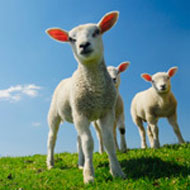Farmers warned of nematodirus infection risk

Lambs are most at risk from six to 12 weeks of age.
Sheep farmers have been warned that milder temperatures this spring come with a higher risk of nematodirus infection.
The Agri-Food and Biosciences Institute (AFBI) says hatching of nematodirus eggs has already begun. Peak hatching took place in the last week of March and first week of April, according to current meteorological readings.
Farmers must be vigilant, AFBI says, as the parasite acts fast and mortality rates are high. Cold spells followed by warmer weather create ideal conditions for the parasite.
Lambs are most at risk from six weeks of age when they are eating significant amounts of grass. They tend to develop resistance around 12 weeks of age.
Nematodirus infection is caused by ingesting of large numbers of worm larvae on contaminated pasture.
Eggs passed by lambs generally remain unhatched on the ground during winter, and undergo mass hatching the following spring. The presents a high risk of infection for lambs grazing the same pasture.
Clinical signs usually develop two weeks after large numbers of larvae have been ingested. Farmers are warned to watch out for lambs with watery yellow-green scour or ill thrift.
Farmers who feel their lambs are at risk have been advised to contact their vet or local CEFRE beef and sheep advisor.



 The latest
The latest